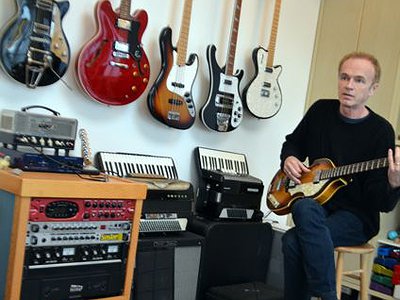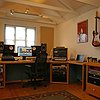What was your first recording-related job - and what or who were your early passions and influences?
Late '60s British bands were the first thing to really light me up, the usual suspects … the Beatles, Stones, Kinks, the Who, Procol Harum and the rest.
From the American side it was the Beach Boys, Buffalo Springfield, and Todd Rundgren amongst others. My mother played piano and we had one in the house when I was a kid. I taught myself to play by figuring out the piano parts on my favourite records. I still can’t read a note … all by ear I’m afraid. I picked up guitar and bass by hanging out with friends and joining bands in high school.
I left home quite young and went to Los Angeles. I fell in with the right crowd, so to speak, and soon was doing my first session work playing on publishing demos, and as a gun-for-hire doing live shows and eventually national tours with name acts. Looking back, I was pretty damn lucky!
What do you personally consider to be the incisive moments in your artistic work and/or career in the field of recording?
After a couple years in L.A. I was getting some fairly serious session work, playing and programming synths for producers like Lenny Woranker and Richard Perry. I owned one of the only CS80s in town, and got pretty good on it. When I was 22, I played on a number one single called ‘Magnet and Steel’ by Walter Eagan, produced by Lindsey Buckingham. 3 months later I was playing 10,000 seaters.
The real turning point, though, was when I set up my first home studio, based around a Tascam 3340 and an Ampex 1/2 inch 4-track machine. It was in a garage and I had the space to record drums as well as guitars and keyboards. I’d learned a lot working as a studio player, but learned even more by having to pre-mix instruments and bounce back and forth between the two 4-track machines. You can’t go back and change the balance! No smpte sync or midi in those days. It’s kind of a lost art now, but loads of records we still listen to were made that way. I love the flexibility of computers, and now I’m almost totally ‘in the box’, but I wouldn’t trade the experience I got in that garage for anything.
How would you personally define your role in the creative process? What is the scope and what are the limitations of what you are capable of doing? In how far do you feel increasing technical education even among amateur musicians has changed this role?
Brian Eno once said that sometimes the most valuable thing a producer can do is make the tea. In other words, keep out of the way. I’ve always been very hands-on, and often, but not always, do quite a lot of playing on the records I produce. Some artists want and need that, others get a bit annoyed. I have to be aware of the boundaries and step back when necessary. Every project is different; that’s one of the reasons producing is such a great job, and why I still enjoy the process.
With so much technology available for so little money now, home demos have gotten very sophisticated. That usually makes my job easier, having a solid starting point, though sometimes the artist can become too attached to the work they’ve done on their own. It’s a double-edged sword.
In which way does the way music sounds change the way it is perceived? How do you see the relative importance of sound and composition?
I would say its a 40/60 split between sound and composition in a record context, though I would call ‘sound’ the ‘presentation’. At the end of the day though, if the song is crap, it doesn’t matter how amazing the recording might sound.
What, to you, are the main goals of recording, editing and mastering? Do you, for example, feel it important that a recording is a reflection of reality or is it by default artifice and therefore subject to its own rules?
I think records follow their own rules by default, like paintings or novels or any art-form that depends on the observer’s subjectivity. A recording of a band playing live, or a studio construct with no hands-on performance, both live or die by what the listener brings to the experience. So, you know, the mechanics of recording are only a means to an end. No rules, as long as somebody somewhere enjoys listening to it.
Recording can be related to a particular location, but thanks to technology, it no longer has to be. How do you see the relation between sound, location and space?
There have been huge advances in reverb- and echo-plugins over the past few years, and convolution tech has raised the bar again. But there will always be a place for great studio ambience, both for the sound, and especially for the comfort and inspiration of the players. A top-flight residential studio like Peter Gabriel’s Real World helps create a working space and experience that you will never get from a simulation.
In how far are the objective, universal and measurable parameters for what constitutes quality in a recording? What are currently your main challenges and ambitions in terms of your approach to production?
Quality is always in the ears of the listener; vibe, performance and a great song are everything. Objective judgements usually come from engineers. Which is a higher ‘quality’ recording, Crime of the Century by Supertramp, or Blunderbuss by Jack White? Know what I mean? And this might sound a bit simple, but my main concerns when producing are: ‘do I like it’?, and ‘will anyone want to buy it’? Being satisfied personally, and knowing the artist is proud of the work we’ve done together are the most important things to me. Overall approach changes from project to project.
Tell us about your studio, please. What were criteria when setting it up and how does this environment influence the creative process? How important, relatively speaking. are factors like mood, ergonomics, haptics and technology for you?
I set up my current room about four years ago in an out-building at my home in southern England. I have some great old gear in the racks, mostly from a much larger studio I had in New York, but I’m ‘in the box’ more and more lately. The new room is small, but it’s all I need, and it sounds really good. I’ve been able to mix at home for the first time, and that’s a real game changer. If I need to do some heavy lifting, I go to Sarm or Real World for tracking, then bring the work home on hard-drives. Perfect.
Daylight in the control room has become more important to me over the years, and the new space is very light, with sea views as well…could be worse. I’m fairly tidy and don’t like to see a bunch of wires everywhere, so I had a patch-bay built that makes life easier. When I’m working on my own I move between instruments all the time, and it’s nice to have everything ready to go with no dicking around.



